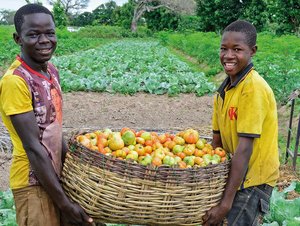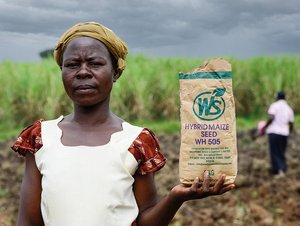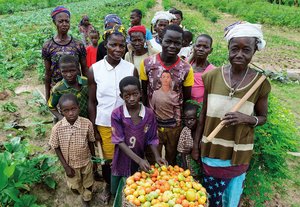Food Systems

The more globalisation moves forward, the more complex the interplay between different stakeholders becomes. But what does this mean for the agricultural and food sector in rural areas in particular? A food system comprises not only traditional value chains, but also consumption and the environment. This calls for concerted action among governments, the private sector and civil society to achieve a sustainable and healthy food system, including its value chains, while considering the different conflicts of interest among the parties involved. In order to understand each other, a common language should be created. This can be achieved through standards and certifications, but also through clearly formulated agreements such as in contract farming. Over the last decades, products produced under labour and social standards or certified by sustainability standards such as Fairtrade or organic standards have come into play and are more popular with the consumer side. But who benefits from this? Is it the small-scale farmers, who have to adapt their production, increase their income and yields, reduce health and environmental risks caused by inappropriate farming practices and enhance nutrition diversity on their own plate while creating traceability and transparency at the same time?
- Getting change for climate action into food systems should start with the UN(2024)
- Just rewards, or just rewarding business-as-usual?(2022)
- Sustainable food systems need True Cost Accounting(2022)
- Tax or spend? What is at stake for agri-food systems transformation(2022)
- Supply chain finance – a viable option for smallholder farmers?(2022)
- Towards a renaissance of agricultural development banks in sub-Saharan Africa?(2022)
- The CAADP 10 per cent target – still pursued by African leaders?(2022)
- "Human capital will play a pivotal role in the transformation of African economies"(2022)
- Assessing the effectiveness of multilateral funds in coping with drought(2022)
- "The bankers are interested in the low-hanging fruits"(2022)
- Food system transformation needs private sector support(2022)
- "Private actors are much closer to reality"(2022)
- "We have a shared goal to improve the sustainability impact of the agri-food sector"(2022)
- The moment is now - A convergence of pressing need and promising opportunity for advancing sustainable development(2021)
- Food systems – beyond the buzz (2021)
- Why food systems transformation is crucial for achieving the SDGs(2021)
- "Transformation requires effective institutions"(2021)
- "We cannot leave the battleground to corporations and market interests"(2021)
- Fair, healthy, global – helping to reshape our food system(2021)
- The future of Rösti and Fondue – Switzerland’s contribution to the food systems dialogues(2021)
- Putting food systems analysis into practice – the example of Ethiopia’s Wag Himra Zone (2021)
- Nutrition-sensitive agriculture and improved nutrition in mountain areas: Rural service providers as catalysts (2021)
- Wind of change – the growing momentum for agroecological transitions(2021)
- Unlocking the potential of agroecological approaches – the Transformative Partnership Platform on Agroecology(2021)
- "Agroecology is the future"(2021)
- Small-scale farmers responses to COVID-19 related restrictions(2021)
- Building our food systems back better(2020)
- Talking about food systems - a paradigm shift?(2019)
- Sustainability standards, traceability and certification(2019)
- Better coordination through contract farming(2019)
- ICT – connecting the food system(2019)
- Does Fairtrade benefit farmers and rural labourers in Africa?(2019)
- Enhancing water productivity by using a “push-pull-policy” approach(2019)
- Many players, one goal – the Green Innovation Centre in India(2019)
- Access for women – building up a system of rural private service providers(2019)
- Making poultry great again!(2019)
- Private sector development and international trade in The Gambia(2019)
Financing sustainable agri-food systems

So far, global food and agricultural policies have not succeeded support agri-food systems benefiting the many and taking threats to ecosystems into account. What we need is not only a mobilisation of resources, but, above all, a transformation of our food finance architecture.
- Just rewards, or just rewarding business-as-usual?(2022)
- Sustainable food systems need True Cost Accounting(2022)
- Tax or spend? What is at stake for agri-food systems transformation(2022)
- Supply chain finance – a viable option for smallholder farmers?(2022)
- Towards a renaissance of agricultural development banks in sub-Saharan Africa?(2022)
- The CAADP 10 per cent target – still pursued by African leaders?(2022)
- "Human capital will play a pivotal role in the transformation of African economies"(2022)
- Assessing the effectiveness of multilateral funds in coping with drought(2022)
- "The bankers are interested in the low-hanging fruits"(2022)
- Food system transformation needs private sector support(2022)
- "Private actors are much closer to reality"(2022)
- "We have a shared goal to improve the sustainability impact of the agri-food sector"(2022)
Food systems transformation

Our current agricultural and food systems are not capable of providing the global population with sufficient and healthy food within the planetary boundaries. Worse still, with their high freshwater consumption, their greenhouse gas emissions and their representing a threat to biodiversity, they destroy their very own ecological basis. The multiple crises of the last few years have added to all this, with the consequence that Sustainable Development Goal 2 – ending hunger by 2030 – will definitely not be reached. A profound transformation of our agri-food systems is necessary – towards sustainability, resilience, health, equity and inclusiveness.
- "We have to align the transformation agenda with African realities"(2023)
- Transforming agricultural and food systems – why and how(2023)
- Policy coherence and food systems transformation(2023)
- Supporting governments in optimising agricultural spending and policies – FAO’s MAFAP programme(2023)
- Gender justice – a precondition for resilience(2023)
- People-centred collaboration – four key principles for equity and sustainability in the food systems transformation(2023)
- “A system that is uniform is not resilient”(2023)
- From vision to action – towards resilient food systems in Ethiopia’s highlands (2023)
- The socio-economic effects of the commercialisation of African indigenous vegetables(2023)
- Leveraging the potential of secondary cities(2023)
- How effective are policy interventions in food environments?(2023)
- Food systems transformation in Vietnam – research and collaboration lay the foundation(2023)
- Welthungerhilfe’s food system framework – a compass for practitioners (2023)
- Igniting a spark for landscape restoration(2023)



